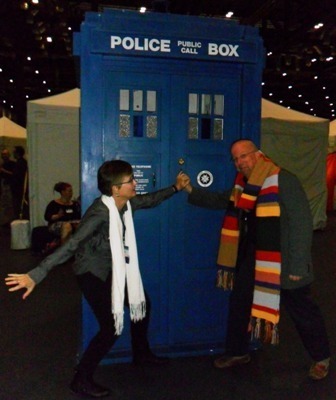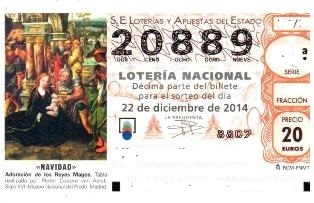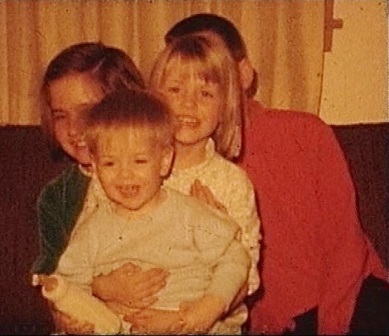Sue Burke's Blog, page 64
December 25, 2014
Our 2014 Christmas newsletter
In case you’re not on our Christmas card list, here’s a holiday newsletter from my husband, Jerry Finn, and me.
2014 Holiday Greetings
This year began sadly. Sue's sister Beth died on January 9 of cancer. Sue got to visit her for six weeks at the end of 2013, which was a great comfort. Beth was telling jokes until the end.
In happier news, in early August we traveled to Bayonne, on the French seacoast, for Jerry's brother Tom's birthday. We spent several days with him and his wife Mary swimming and visiting the sights.

We also went to London later in August to attend the World Science Fiction Convention, arriving a day early for some tourism, and we saw Julius Caesar at Shakespeare's Globe Theatre.
Jerry traveled for work to Milan, Tel Aviv, and Budapest for work this year, and he's continuing to study Portuguese and take classes new computer technologies.
Sue's translation of the novel Prodigies by Angélica Gorodischer should be published by Small Beer Press in August 2015. She also translated the script for a film, Mindgate, that should enter production in spring. She's still writing, had a short story, “Summer Home,” published in Asimov's Magazine, and is looking for an agent for a novel.
As usual, we plan to spend a quiet Christmas in Spain.
¡Felices fiestas y próspero año nuevo!
2014 Holiday Greetings
This year began sadly. Sue's sister Beth died on January 9 of cancer. Sue got to visit her for six weeks at the end of 2013, which was a great comfort. Beth was telling jokes until the end.
In happier news, in early August we traveled to Bayonne, on the French seacoast, for Jerry's brother Tom's birthday. We spent several days with him and his wife Mary swimming and visiting the sights.

We also went to London later in August to attend the World Science Fiction Convention, arriving a day early for some tourism, and we saw Julius Caesar at Shakespeare's Globe Theatre.
Jerry traveled for work to Milan, Tel Aviv, and Budapest for work this year, and he's continuing to study Portuguese and take classes new computer technologies.
Sue's translation of the novel Prodigies by Angélica Gorodischer should be published by Small Beer Press in August 2015. She also translated the script for a film, Mindgate, that should enter production in spring. She's still writing, had a short story, “Summer Home,” published in Asimov's Magazine, and is looking for an agent for a novel.
As usual, we plan to spend a quiet Christmas in Spain.
¡Felices fiestas y próspero año nuevo!
Published on December 25, 2014 01:59
December 22, 2014
I’m a little bit richer today

The Spanish Christmas lottery, El Gordo, was drawn this morning. My number, 20889, won a pedrea, a “pebble,” a minor prize. It comes out to €100 for me, US$122. I spent €20 on the ticket, so I made €5 for each €1 invested.
I plan to splurge on groceries and books.
The lottery marks the beginning of Christmas celebrations in Spain. They go on until the Three Kings bring presents on January 6. It takes a lot of stamina to make it through the holidays here.
Best wishes to you and yours for the season!
– Sue Burke
Published on December 22, 2014 06:18
December 21, 2014
Will I be rich tomorrow?

Tomorrow is the drawing of El Gordo, the Spanish Christmas Lottery. It will award €2,240 million euros (US$2,783 million) – but that money will be split up into a wide variety of prizes and sub-prizes.
The top prize is 4 million euros, and I bought a décimo, a tenth of a ticket, which cost €20, so I could win at most €400,000 (US$500,000) – but I wouldn’t complain.
Or I could win a smaller prize. If I have one of the numbers before or after the first prize – I have 20889 and if 20888 wins – I would get €2,000 for my décimo. Or if I have the same last two digits as the third prize, I would get €100. One year I won €20 for having the same last digit as the first prize – that is, I got my money back for the ticket purchase.
It’s complicated, so I’ll just go to a newspaper website that has a widget where I can enter my number to learn what I’ve won. Odds are that I’ll win nothing, but I can hope.
Of course, I’ll follow the drawing. As always, it will be carried out by the students of San Idelfonso School, who will sing – yes, sing! – each number and prize. The drawing goes on for three or four hours and will be carried live by every major television station, radio program, and newspaper internet site.
What everyone’s talking about is this year’s advertisement with the slogan, “El mayor premio es compartirlo,” (The best prize is to share). Usually, you buy your lottery décimo from someplace where you have ties, like your workplace or a club so you and your friends all share the same number, and if it wins, you can celebrate together. In the ad, a man didn’t buy a ticket from the corner café where he’s a regular and where a major prize fell. Still, his wife convinces him to go down and offer congratulations, and then ... no spoilers.
http://www.rtve.es/alacarta/videos/loteria-de-navidad/anuncio-loteria-navidad-2014/2856583/
I bought my ticket at the local lottery shop, not the most personal place, but if it wins, I can go down there and find plenty of new friends to celebrate with.
I’ll share the outcome of my luck with you tomorrow for number 20889.
— Sue Burke
Published on December 21, 2014 03:45
December 17, 2014
My sister’s last Christmas tree

A shot of us four Burke kids on Christmas Eve captured from one of our grandfather’s home movies. Beth is the blonde. I’m wearing green. Lou is the baby. Mike is in back.
***
My sister Beth died in January of cancer. Last year was her last Christmas and one of her happiest.
Her son and his wife came to visit toward the end of December and set up and decorated the tree. Beth had inherited the Christmas tree ornaments from my parents and grandparents, and although she was too ill to do more than watch them work, she was entranced. It was, my sister said, the best tree ever.
She described it to me over the phone, and I could see it as she spoke because I knew so many of the ornaments.
My mother had made a canvas-work embroidery angel for the top of the tree. In keeping with family tradition, a little electric candle had been placed in her hands to light her face.
Some old, fancy glass ornaments had been my grandparents’, lovingly cared for by my parents and then by Beth. They were fragile and worn but exceptionally ornate. One had gold stripes edged with glitter and little holiday scenes hand-painted between the stripes.
My sister especially loved the ornament her son had made in grade school, a white paper bird with a long tinsel tale. And there was my ornament from kindergarten, green and red metallic disks glued together around a length of yarn. Other children’s artwork was hung up, too, chronicling a family that grew larger, and boys and girls who grew up. Some ornaments were gifts and careful purchases – each color, each sparkle, each light a story and a memory.
“It’s beautiful,” she said. “I can stare at it for hours.”
It held happy memories from her whole life, as merry as a Christmas tree ever could be – the best gift, the best tree ever.
— Sue Burke
Published on December 17, 2014 03:53
December 10, 2014
Go Ahead — Write This Story: Frustration
It’s so frustrating! How can you show you character's frustration when you're writing a story? Lots of ways, since people react differently. Your character might drink heavily, give up, work harder, work smarter, get angry, blame fate, blame someone else, complain, get depressed, pretend it doesn’t matter, or seek revenge. Emotions may vary widely and be mixed. The point is, your character reacts, and this moves the plot forward.
If you need a story to frustrate a character with, here are a few ideas:
• This is a retold fairy tale in which the fairy godmother’s promises do not come true as expected, and the godchild’s life spirals down into debt and failure.
• This is a horrific family drama about Take Your Child to Work Day, and the child soon realizes that what the parent does is repugnant – and may be evil.
• This is an experimental stage play that re-enacts a computer game, and the characters, aware that it is a game, do everything in their power to subvert and ridicule it, but rules are rules.
— Sue Burke
If you need a story to frustrate a character with, here are a few ideas:
• This is a retold fairy tale in which the fairy godmother’s promises do not come true as expected, and the godchild’s life spirals down into debt and failure.
• This is a horrific family drama about Take Your Child to Work Day, and the child soon realizes that what the parent does is repugnant – and may be evil.
• This is an experimental stage play that re-enacts a computer game, and the characters, aware that it is a game, do everything in their power to subvert and ridicule it, but rules are rules.
— Sue Burke
Published on December 10, 2014 04:02
December 4, 2014
Off to MIRcon

I’ll be at MIRcon this weekend, Spain’s 31st national science fiction, fantasy, and horror convention, also called HispaCon. It’s being held this year in Montcada i Reixac, a suburb of Barcelona.
Activities will include panels, conferences, an awards dinner, children’s activities, a Catalan-language track, exhibits, sales stands, signings, meetings, a zombie walk, a Night’s Watch Oath, and videos. Guests of honor are Nina Allan, Aliette de Bodard, Christopher Priest, Karin Tidbeck, Carlos Sisi, and Félix J. Palma. A lot of other Spanish authors will be there, too.
I’ll be on a panel with Mariano Villareal at 10:30 a.m. Monday presenting Castles in Spain / Castillos en el aire. We’ll hold a Kickstarter campaign starting in January to get this “best of” Spanish anthology translated into English. (You’ll hear a lot more about this.)
If you happen to be in Barcelona, you’re welcome to drop in. Events are free and open to the public. We’ll have fun.
— Sue Burke
Published on December 04, 2014 03:27
December 1, 2014
A very brief interview of me
My Madrid writing friend Andrew Chritchley interviews me: 9 questions, no more than 25 words per answer. And yet, it tells you everything you ever needed to know about me....
https://cartesiantheatre.wordpress.com/2014/12/01/hollywood-interview-sue-burke/
https://cartesiantheatre.wordpress.com/2014/12/01/hollywood-interview-sue-burke/
Published on December 01, 2014 06:03
November 26, 2014
Individualism vs. Individualismo
In English, “individualism” means self-reliance and personal independence. Its connotation can lean toward eccentricity. (American Heritage Dictionary of the English Language.)
But in Spanish, “individualismo” means acting in voluntary isolation, possibly working for oneself against the good of everyone else. Its connotation can lean toward egotism and selfishness. (Real Academia Española, Diccionario de la Lengua Española.)
Still, the words “individualismo” and “individual” are usually considered equivalent in meaning and translated as if they were identical, even though they’re not. (Oxford Spanish-English/English-Spanish Dictionary.)
This means that when an American talks about “rugged individualism,” what a Spaniard hears is something different. I know this because I’ve spent enough time in both countries to observe the misunderstanding.
Who knows what happens in other languages? With other words? I know that the word “multiculturalism” mean different things, even among English-speaking countries. It can mean everything from a multi-flavored melting pot to voluntary or enforced apartheid.
So be careful with words. False friends are pairs of words or phrases in two languages or dialects of the same language that look or sound similar but differ significantly in meaning. False friends can make real enemies needlessly.
— Sue Burke
But in Spanish, “individualismo” means acting in voluntary isolation, possibly working for oneself against the good of everyone else. Its connotation can lean toward egotism and selfishness. (Real Academia Española, Diccionario de la Lengua Española.)
Still, the words “individualismo” and “individual” are usually considered equivalent in meaning and translated as if they were identical, even though they’re not. (Oxford Spanish-English/English-Spanish Dictionary.)
This means that when an American talks about “rugged individualism,” what a Spaniard hears is something different. I know this because I’ve spent enough time in both countries to observe the misunderstanding.
Who knows what happens in other languages? With other words? I know that the word “multiculturalism” mean different things, even among English-speaking countries. It can mean everything from a multi-flavored melting pot to voluntary or enforced apartheid.
So be careful with words. False friends are pairs of words or phrases in two languages or dialects of the same language that look or sound similar but differ significantly in meaning. False friends can make real enemies needlessly.
— Sue Burke
Published on November 26, 2014 03:03
November 24, 2014
Open mic Tuesday
We had so much fun last month we’re doing it again:
The Madrid Writer’s Club will host an open mic at 8:30 p.m. Tuesday, November 25, at El dinosaurio todavía estaba allí Bookstore and Café, calle Lavapiés, 8, Madrid, Spain.
I’ll be reading a piece I wrote as a Christmas gift for my nephew about his father’s first Christmas. You can come to listen and, if you want, read. Scripts, flash fiction, essays, and poetry are welcome, in English. There’s a maximum reading time of 4 minutes.
If you’re in town, drop in.
— Sue Burke
The Madrid Writer’s Club will host an open mic at 8:30 p.m. Tuesday, November 25, at El dinosaurio todavía estaba allí Bookstore and Café, calle Lavapiés, 8, Madrid, Spain.
I’ll be reading a piece I wrote as a Christmas gift for my nephew about his father’s first Christmas. You can come to listen and, if you want, read. Scripts, flash fiction, essays, and poetry are welcome, in English. There’s a maximum reading time of 4 minutes.
If you’re in town, drop in.
— Sue Burke
Published on November 24, 2014 10:36
November 19, 2014
Go Ahead — Write This Story: Overhearing conversations
Listen to people in a mall or at an airport, for example. Take notes. Then analyze them. What is the relationship between speakers? How do you know? What information do they pass? What surprises you? What’s the rhythm? Catchphrases? Persuasion? Conflict? How does each person speak differently? With any luck, you’ll hear ways to make your dialogue more natural and productive for your writing.
You’ll probably get story ideas by eavesdropping, but if not, here are a few. Remember the dialogue.
• This is a dark fantasy story in which a husband asks a friend to seduce his wife so he can have an excuse to divorce her, and the friend suggests conjuring up an incubus instead.
• This is a technological thriller that begins when a researcher reports that a greater number than average of redheads are being born.
• This is a chronicle of the cut-throat competition in the pet business after dogs have been artificially bred to be able to speak.
— Sue Burke
You’ll probably get story ideas by eavesdropping, but if not, here are a few. Remember the dialogue.
• This is a dark fantasy story in which a husband asks a friend to seduce his wife so he can have an excuse to divorce her, and the friend suggests conjuring up an incubus instead.
• This is a technological thriller that begins when a researcher reports that a greater number than average of redheads are being born.
• This is a chronicle of the cut-throat competition in the pet business after dogs have been artificially bred to be able to speak.
— Sue Burke
Published on November 19, 2014 02:27



